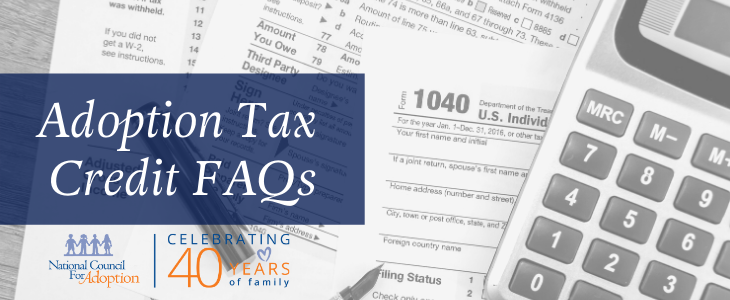2019 Adoption Tax Credit FAQs

By National Council for Adoption
NCFA has been a strong advocate of the Adoption Tax Credit (ATC) since its inception, because it is a fiscally responsible way to help more American families who want to provide a permanent, loving home to children in the U.S. and around the world. In fact, we continue to advocate for the ATC to become refundable again, so that more families can be helped.
We are not tax experts, but fortunately, you don’t need to be one to understand the basics of this credit, which thousands of families claim every year. We’ve put together a list of FAQs to help you get started and provide an update on some of the numbers from our 2019 Adoption Advocate which provides a more in-depth look at the ATC.
1. How does the Adoption Tax Credit work?
The Adoption Tax Credit covers taxpayers’ tax liability up to the maximum amount of the credit (for 2019 is $14,080. For most families, The Adoption Tax Credit increases their refund because they generally get their withholding back and child tax credit becomes additional child tax credit once their tax liability has been covered.
2. What Are Qualifying Adoption Expenses?
Qualified expenses are any expenses necessary for the adoption. For example, court fees, agency fees, attorney fees, travel, meals, paperwork expenses, and any other expense that is required. The only expense that does not qualify are birth mother expenses.
3. Are temporary foster care expenses prior to finalizing adoption considered Qualified Adoption Expenses (e.g. childcare, clothing, furnishings, lodging, food, etc.)?
No.
4. How is the adoption tax credit related to individual tax withholdings?
Some taxpayers adjust their withholding on their W-4 when they know they have the Adoption Tax Credit to cover their tax liability.
5. If a child was adopted through the state and though the parents did not have any expenses, the child does receive adoption subsidy and is considered special needs. Do the parents qualify for the adoption tax credit?
Yes, if a child is declared special needs according to that state’s criteria they will qualify for the full amount of the credit with no expenses necessary.
6. If my income was too high the first year, but is below the cut off limit for this year, can I carry forward the credit from the first year or prior years?
If adoptive parents’ income is too high the year the adoption was finalized, they are disqualified from taking the Adoption Tax Credit altogether. In cases where adoptive parents are eligible to claim it the first year, then the remainder can be carried forward up to five years.
7. When can adoptive parents claim the Adoption Tax Credit?
It depends on the type of adoption. Foster care and intercountry adoptions must be final before you are able to claim the Adoption Tax Credit. For example, in order to claim the credit on your 2019 taxes, the adoption must have been finalized on or before December 31, 2019. An adoption finalized in 2020, would be claimed when filing 2020 taxes. Domestic adoptions can either take the credit when the adoptions are final or the tax year following expenses being paid.
8. Do families who experience an adoption disruption still qualify for the adoption tax credit?
You can claim the Adoption Tax Credit for domestic adoptions that have failed or are not final. However, whatever credit you receive will go against your next successful one.
9. What is the income eligibility criteria for the adoption tax credit?
The income phase-out ranges for 2019 are $211,160 – $251,160. As long as the taxpayer’s Modified Adjusted Gross Income is under $211,160 they are eligible, if they meet all of the other criteria.
For more information, please visit the IRS’s website: https://www.irs.gov/taxtopics/tc607



